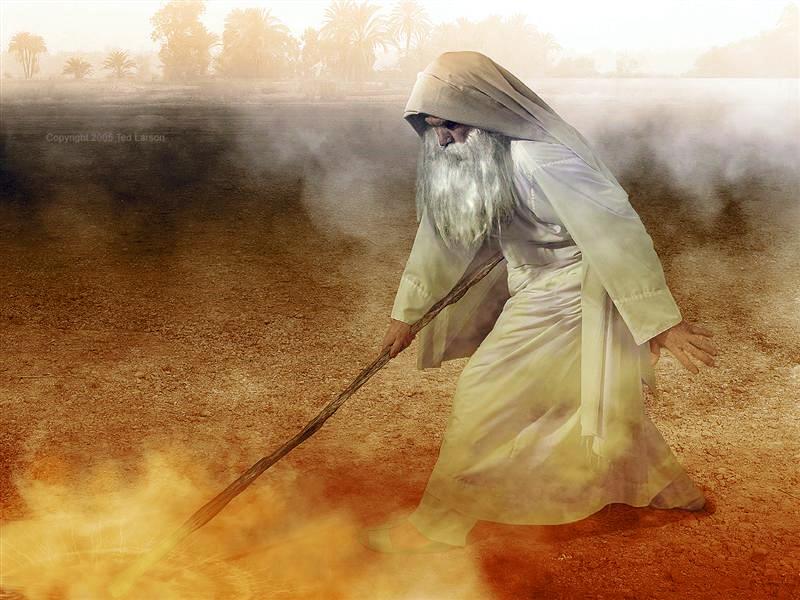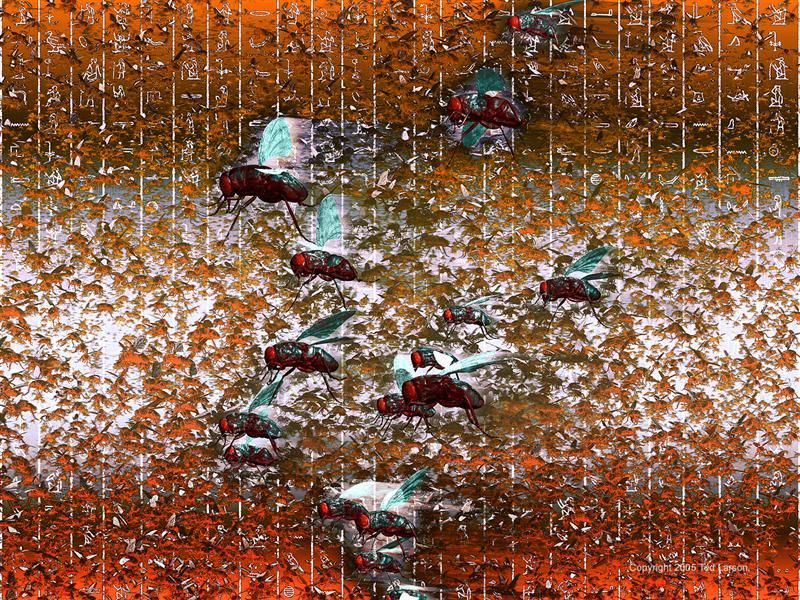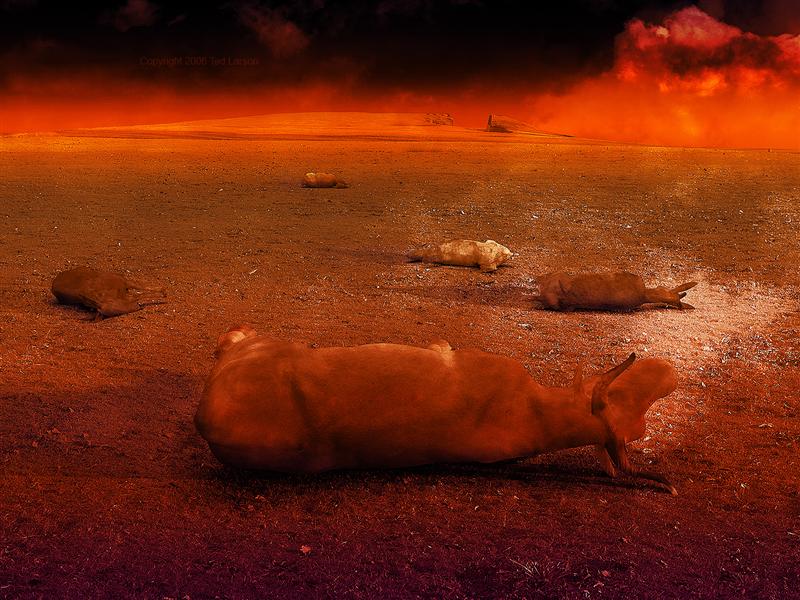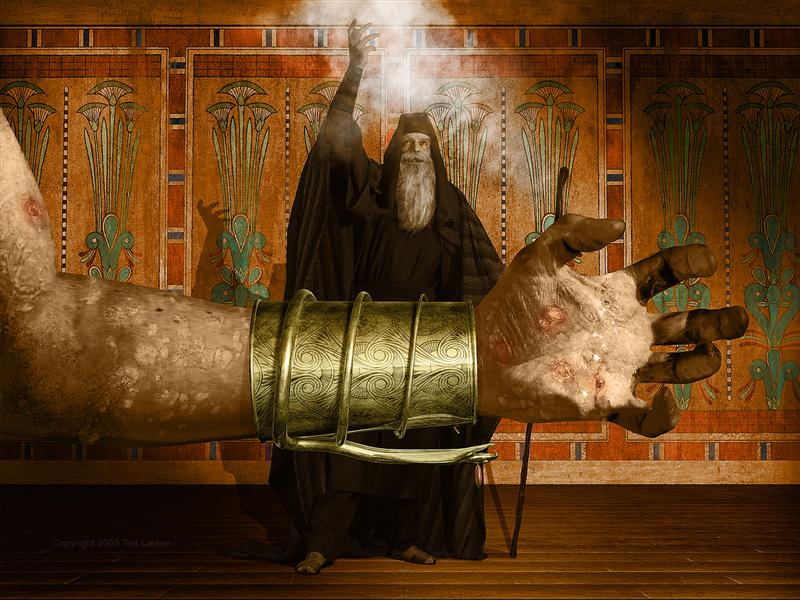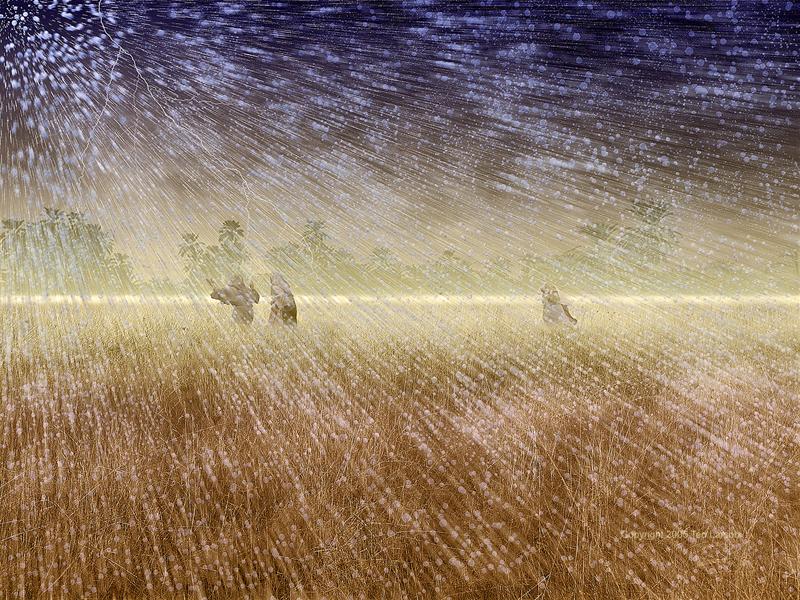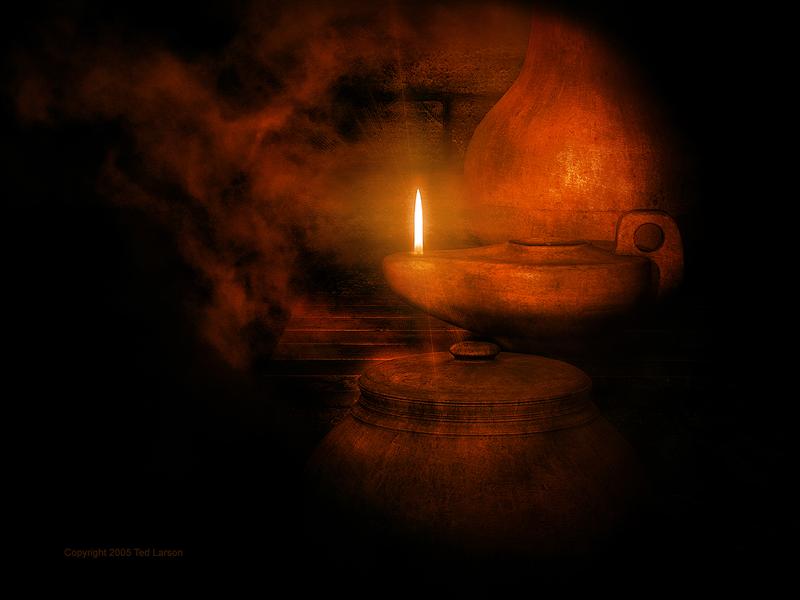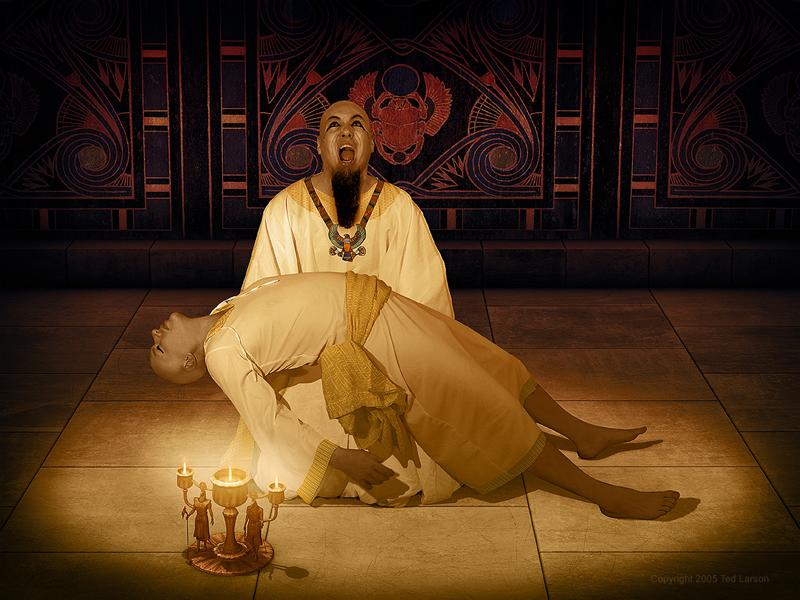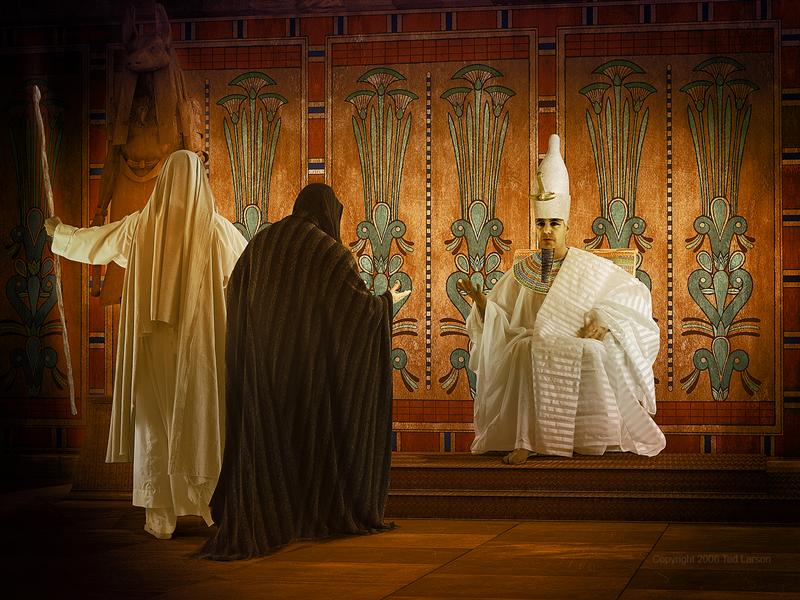 As we read through Exodus 7-12 as part of the annual Torah reading cycle and as part of the readings for Pesach, we find ten plagues that were visited upon Egypt. Psalm11918.org examined the variations between the events of each plague and the patterns within the plague narrative. What we've found is interesting and thought provoking.
As we read through Exodus 7-12 as part of the annual Torah reading cycle and as part of the readings for Pesach, we find ten plagues that were visited upon Egypt. Psalm11918.org examined the variations between the events of each plague and the patterns within the plague narrative. What we've found is interesting and thought provoking.
The plagues tell us the story of how the Most High revealed Himself to the Egyptians as the G-d of Isra'el. As it is written:
Exodus 7:4-5
"When Pharaoh does not listen to you, then I will lay My hand on Egypt and bring out My hosts, My people the sons of Israel, from the land of Egypt by great judgments. The Egyptians shall know that I am the LORD, when I stretch out My hand on Egypt and bring out the sons of Israel from their midst."
Reading through the narrative of the plagues, it seems as if they were specifically chosen to point out the powerlessness of the "gods" of the Egyptians. Let's take a closer look...
Plague #1: Blood
Exodus 7:20
So Moses and Aaron did even as the LORD had commanded. And he lifted up the staff and struck the water that was in the Nile, in the sight of Pharaoh and in the sight of his servants, and all the water that was in the Nile was turned to blood.
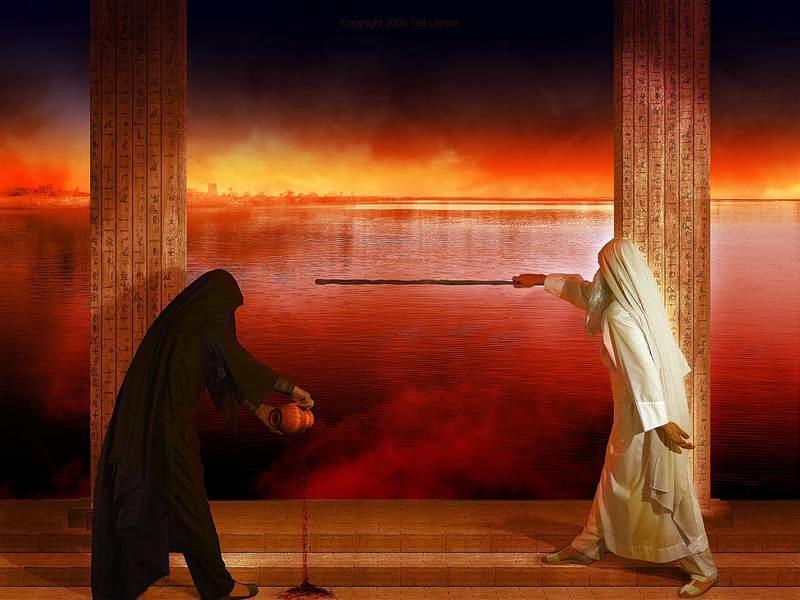
Observations
- First plague in the Exodus narrative
- First plague involving water
- G-d gives an explanation (perhaps a warning?) beforehand through Moshe (Exodus 7:15-18)
- G-d speaks to Moshe who communicates to Aharon (Exodus 7:19)
- Aharon strikes the water with his staff (Exodus 7:20)
- Pharaoh does not ask for it to stop
- Pharaoh's heart was hardened (the phrasing almost implies an automatic response) (Exodus 7:22)
- It lasts seven days (Exodus 7:25)
Related Egyptian god:
- Anuket - goddess of the Nile
Plague #2: Frogs
Exodus 8:6
So Aaron stretched out his hand over the waters of Egypt, and the frogs came up and covered the land of Egypt.
Observations
- Second plague in the Exodus narrative
- Second plague involving water
- G-d gives a warning and a choice to Pharaoh through Moshe (Exodus 8:1-4)
- G-d speaks to Moshe who communicates to Aharon (Exodus 8:5)
- Aharon stretches out his hand (singular) over the waters of Egypt (Exodus 8:6)
- Pharaoh asks for it to stop (Exodus 8:8)
- It lasts an unknown period of time and then stops after Moshe lifts his voice in supplication to G-d (Exodus 8:12)
- Pharaoh hardened his heart (Exodus 8:15)
Related Egyptian gods:
- Heket - frog-headed goddess of childbirth
- Kuk - frog-headed god of darkness
- Nun - frog-headed god of primordial waters
Plague #3: Lice
Exodus 8:17
And they did so: for Aaron stretched out his hand with his rod, and smote the dust of the earth: and lice came upon man and upon beast: all the dust of the earth was lice throughout all the land of Egypt.1
Some English Bibles translate the Hebrew word kinim as "gnats", however, the root of this word implies a "fastening" insect. Strong's Concordance lists this alternatively as "lice".2 The Artscroll Tanakh Stone Edition also translates the word as "lice".3 The Septuagint uses the Greek word sknifev which is not found in Strong's Concordance.
The New English Translation online includes the following note on the topic:
"Lice" follows the reading in the Peshitta and Targum (and so Josephus, Ant. 2.14.3 [2.300]). Greek and Latin had "gnats." By "gnats" many commentators mean "mosquitoes," which in and around the water of Egypt were abundant (and the translators of the Greek text were familiar with Egypt). Whatever they were they came from the dust and were troublesome to people and animals. 4
Observations
- Third plague in the Exodus narrative
- First plague to involve the (dust of the) earth
- G-d gives no warning to Pharaoh
- G-d speaks to Moshe who communicates to Aharon (Exodus 8:16)
- Aharon strikes the dust of the earth with his staff (Exodus 8:17)
- Pharaoh does not ask for it to stop
- It lasts an unknown period of time and is not described as stopping
- Pharaoh's heart was hardened (Exodus 8:19)
Related Egyptian god:
- Geb - god of the earth
Plague #4: Swarms
Exodus 8:21
For if you do not let My people go, behold, I will send swarms of flies on you and on your servants and on your people and into your houses; and the houses of the Egyptians will be full of swarms of flies, and also the ground on which they dwell.
Some English translators take the Hebrew word arov to mean "swarms of flies", however, the root of this word implies a "mixture" of various types of things. Strong's Concordance defines this generically as a "swarm" without indicating its contents. 5 The Artscroll Tanakh Stone Edition translates the term as "swarms of wild beasts". 6
The Septuagint uses the Greek word kunomuion (Strong's #2952) which is the plural neuter diminuitive of "dog" and means "little dogs". Some have interpreted this to mean the "dog fly", however, most Jewish interpretations lean towards swarms of various wild animals (including dogs, lions, and jackals). This interpretation fits with a (possibly) related verse in the book of Revelation. Revelation 6:8 refers to a plague involving "wild beasts of the earth".
Observations
- Fourth plague in the Exodus narrative
- Involves air (the flies appeared out of thin air) or alternatively
Involves animals - G-d gives a warning and a choice to Pharaoh through Moshe (Exodus 8:20-23)
- G-d speaks to Moshe but no command is related to Aharon (Exodus 8:20)
- There is no stretching out of hand or staff in this plague
- Pharaoh asks for it to stop (Exodus 8:25)
- It lasts an unknown period of time and then stops after Moshe makes supplication to G-d (Exodus 8:30)
- Pharaoh hardened his heart (Exodus 8:32)
Related Egyptian gods:
- Seth - jackal-headed god of chaos
- Tefnut - lion-headed goddess of moisture and fertility
Plague #5: Pestilence
Exodus 9:1-3
Then the LORD said to Moses, "Go to Pharaoh and speak to him, 'Thus says the LORD, the G-d of the Hebrews, "Let My people go, that they may serve Me. For if you refuse to let them go and continue to hold them, behold, the hand of the LORD will come with a very severe pestilence on your livestock which are in the field, on the horses, on the donkeys, on the camels, on the herds, and on the flocks.
Observations
- Fifth plague in the Exodus narrative
- Involves animals (Exodus 9:3)
- Horses (animals of war)
- Donkeys (animals of personal or commercial tranport)
- Camels (animals of personal or commercial transport)
- Herds (cattle- animals for food?)
- Flocks (sheep and goats- animals for food?)
- G-d gives a warning and a choice to Pharaoh through Moshe (Exodus 9:1-5)
- G-d speaks to Moshe but no command is related to Aharon (Exodus 9:1)
- There is no stretching out of hand or staff in this plague
- Pharaoh does not ask for it to stop (possibly because all the animals already dead and there is no gain in asking at that point)
- It lasts an unknown period of time (possibly 1 day?) and then it is implied that it stops with the death of the animals and does not continue
- G-d hardened Pharaoh's heart (Exodus 9:12)
Related Egyptian gods:
- Hathor - cow-headed (or cow horned) goddess of love
- Isis - goddess shown as a woman with cow horns curved around the sun
Plague #6: Boils
Exodus 9:10
So they took soot from a kiln, and stood before Pharaoh; and Moses threw it toward the sky, and it became boils breaking out with sores on man and beast.
Observations
- Sixth plague in the Exodus narrative
- Involves "man and beast"
- G-d gives no warning to Pharaoh
- G-d speaks to both Moshe and Aharon directly (Exodus 9:8)
- Moshe and Aharon both use their hands (plural) to throw soot into the air
- Pharaoh does not ask for it to stop
- It lasts an unknown period of time and is not described as stopping
- Pharaoh's heart was hardened (Exodus 9:35)
Related Egyptian gods:
- Imhotep - god of wisdom and medicine
Plague #7: Hail
Exodus 9:22-24
Now the LORD said to Moses, "Stretch out your hand toward the sky, that hail may fall on all the land of Egypt, on man and on beast and on every plant of the field, throughout the land of Egypt." Moses stretched out his staff toward the sky, and the LORD sent thunder and hail, and fire ran down to the earth. And the LORD rained hail on the land of Egypt. So there was hail, and fire flashing continually in the midst of the hail, very severe, such as had not been in all the land of Egypt since it became a nation.
Observations
- Seventh plague in the Exodus narrative
- Second plague involving the sky/air
- G-d gives a warning to Pharaoh through Moshe (Exodus 9:13-19)
- G-d speaks to Moshe but no word is given to Aharon (Exodus 9:13)
- G-d tells Moshe to stretch out his hand (singular) toward the sky (Exodus 9:22) but Moshe stretches out his staff (Exodus 9:23)
- Pharaoh asks for it to stop (Exodus 9:28)
- It lasts an unknown period of time and then stops after Moshe spreads out his hands (plural) in supplication before G-d (Exodus 9:33)
- Pharaoh's heart was hardened (Exodus 9:35)
Related Egyptian gods:
- Nut - goddess of the sky
Plague #8: Locusts
Exodus 10:4-5
For if you refuse to let My people go, behold, tomorrow I will bring locusts into your territory. They shall cover the surface of the land, so that no one will be able to see the land. They will also eat the rest of what has escaped-- what is left to you from the hail--and they will eat every tree which sprouts for you out of the field.
Observations
- Eighth plague in the Exodus narrative
- Involving the sky/air (the source) and the land (what is plagued)
- G-d gives a warning to Pharaoh through Moshe and Aharon both (Exodus 10:3)
- G-d speaks to Moshe but no word is given to Aharon (Exodus 10:1, 12)
- G-d tells Moshe to stretch out his hand (singular) toward the sky (Exodus 10:12) but Moshe stretches out his staff (Exodus 10:13)
- Pharaoh asks for it to stop (Exodus 10:17)
- It lasts an unknown period of time and then stops after Moshe makes supplication before G-d (Exodus 10:18)
- G-d hardens Pharaoh's heart (Exodus 10:20)
Related Egyptian gods:
- Osiris - god of fertility
- Neper - god of grain
- Renenutet - cobra goddess of harvest and fertility
Plague #9: Darkness
Exodus 10:21
Then the LORD said to Moses, "Stretch out your hand toward the sky, that there may be darkness over the land of Egypt, even a darkness which may be felt."
Observations
- Ninth plague in the Exodus narrative
- Involves the sky (light from the sun, moon, and stars) and light in general
- G-d gives no warning to Pharaoh
- G-d speaks to Moshe but no word is given to Aharon (Exodus 10:21)
- G-d tells Moshe to stretch out his hand (singular) toward the sky (Exodus 10:21) and Moshe does so (Exodus 10:22)
- Pharaoh asks for it to stop (Exodus 10:24)
- It lasts for 3 days (Exodus 10:22)
- This darkness could be felt
- G-d hardens Pharaoh's heart (Exodus 10:27)
Related Egyptian gods:
- Aten - god of the disk of the sun
- Kheperi - god of the rising sun
- Atum - god of the setting sun
- Herishef - long-horned ram with atef crown and sun disc headdress- creator
- Ra - sun god and creator of the universe
Plague #10: Death of the Firstborn
Exodus 11:4-5
Moses said, "Thus says the LORD, 'About midnight I am going out into the midst of Egypt, and all the firstborn in the land of Egypt shall die, from the firstborn of the Pharaoh who sits on his throne, even to the firstborn of the slave girl who is behind the millstones; all the firstborn of the cattle as well.
Observations
- Tenth and final plague in the Exodus narrative
- Involves the firstborn
- G-d gives no warning to Pharaoh
- G-d speaks to Moshe but no word is given to Aharon (Exodus 11:1)
- G-d tells Moshe that He is "going out into the midst of Egypt" (Exodus 11:4) and we see later that "the Lord struck all the firstborn in the land of Egypt" (Exodus 12:29)
- Pharaoh does not ask for it to stop (for it is already done) but tells Moshe to leave (Exodus 12:31-32)
- It happened at midnight (Exodus 12:29)
Related Egyptian gods:
- Khnum - ram-headed god who created humans
- Min - the god of reproduction
- Isis - goddess of fertility and protector of children
- Hathor - goddess that attended the birth of children
- Apis - bull god who was a "firstborn" animal
- Horus - falcon-headed god who is a national god of protection
In dealing with these particular "gods" it is as if G-d were asking "Do you worship these images, these idols, these things as gods, as that which created you and protects you?"
Deuteronomy 32:39
See now that I, I am He, And there is no god besides Me; It is I who put to death and give life. I have wounded and it is I who heal, And there is no one who can deliver from My hand.
Summary Chart
| Plague | What was involved? (source & affected) |
P W h a a r r n o e a d h ? |
Spoken to | Delivered by | Delivered via | Ends? | Plague | ||||||||||||||||
| W a t e r |
E a r t h |
A i r |
P l a n t s |
P e o p l e |
A n i m a l s |
L i g h t |
M o s h e |
A h a r o n |
M o s h e |
A h a r o n |
G o d |
H a n d |
S t a f f |
Y e s |
S u p p l i c a t i o n |
||||||||
| #1- Blood | S | A | A | Yes | #1- Blood | ||||||||||||||||||
| #2- Frogs | S | A | Yes | #2- Frogs | |||||||||||||||||||
| #3- Lice | S | A | A | #3- Lice | |||||||||||||||||||
| #4- Swarms | S | A | S | Yes | #4- Swarms | ||||||||||||||||||
| #5- Pestilence | A | Yes | #5- Pestilence | ||||||||||||||||||||
| #6- Boils | S | A | A | #6- Boils | |||||||||||||||||||
| #7- Hail | S | A | A | A | Yes | #7- Hail | |||||||||||||||||
| #8- Locusts | S | A | Yes | #8- Locusts | |||||||||||||||||||
| #9- Darkness | A | A | A | #9- Darkness | |||||||||||||||||||
| #10- Firstborn | A | #10- Firstborn | |||||||||||||||||||||
If there are any additional details or observations we should in this article, please contact us and let us know.
Footnotes
1. 1587 Geneva Bible (spelling of lice adjusted from 'lyce') [back]2. e-Sword referencing Strong's Exhaustive Concordance by James Strong, S.T.D., LL.D., 1890. [back]
3. Artscroll Tanakh, Stone Edition, Second Edition © 1996 Mesorah Publications, p151 [back]
4. net.bible.org notes on Exodus 8:16 (01/10/2008) at http://net.bible.org/verse.php?book=Exo&chapter=8&verse=16 [back]
5. e-Sword referencing Strong's Exhaustive Concordance by James Strong, S.T.D., LL.D., 1890. [back]
6. Artscroll Tanakh, Stone Edition, Second Edition © 1996 Mesorah Publications, p151 [back]

